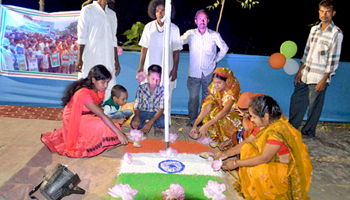 Mashaldanga (Cooch Behar), Aug 1: At midnight between July 31 and August 1, 68 years of protracted struggle of nearly 55,000 people on either side of the Indo-Bangladesh border came to an end.
Mashaldanga (Cooch Behar), Aug 1: At midnight between July 31 and August 1, 68 years of protracted struggle of nearly 55,000 people on either side of the Indo-Bangladesh border came to an end.
As a somewhat elaborate ceremony ushered in the witching hour, more than 15,000 people from various enclaves around Cooch Behar were welcomed into the Indian citizenry just as some 40,000 people were proffered the same privilege in Bangladesh. For the first time, the Tricolour fluttered in a remote corner of India not much unlike August 15, 1947.
The evening’s events were preceded by a formal ceremony at Chengrabandha border, where Pankaj Sharon, the Indian High Commissioner to Dhaka met Syed Mujammal Ali, the Bangladeshi High Commissioner to India. The two countries are set to exchange maps and other relevant documents soon.
The people’s ceremony was held at Mashaldanga, one of the largest Bangladeshi enclaves in India. On Friday, they marked their last day of statelessness by lighting 68 candles in every household of the enclaves in remembrance of the number of years they struggled with anonymity.
As the large gathering at Mashaldanga expressed joy with intermittent applause and ecstatic hoots, the older ones seemed concerned with what lies forward.
While they now have the opportunity to look forward to amenities that come with citizenship, community elders shared guarded thoughts on things they need – schools, health centres, power supply, irrigation and drinking water facilities, access to safety and security – what they have been deprived of for all these years. Will the government actually initiate the process of development they have dreamt of for so long? This was the question topmost on their minds.
Following the formal meeting between Prime Minister Narendra Modi and his Bangladeshi counterpart, Sheikh Haseena, earlier this year, the Central government announced funding of Rs 3,008 crore for running development projects in these areas, which will be dispensed through the state government in phases.
While this carries the promise and makes most people believe the government is serious about developing these areas, apprehensions are hard to rule out. Many of them fear that politicking between the state and the Centre could continue to leave them underprivileged.
But these apprehensions seemed short-lived at least on the evening of July 31 when all that mattered was the jubilation, even though somewhat subdued in keeping with the period of national mourning following the demise of former president A P J Abdul Kalam. Under strict instructions from functionaries of Bharat Bangladesh Enclaves Exchange Coordination Committee, which has been spearheading their movement for the past two decades, there were no fireworks. That, however, did not stop enclave residents from making the best of it, with beaming smiles and a skip in their step. “All’s well that ends well,” said, Mansur Miyan, one of the oldest residents of the area. Govrnment officials will hoist national flag in each of the enclave that will be part of India at 9 am on Saturday.






Comments
Add new comment